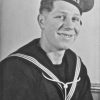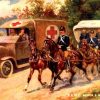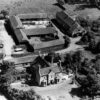2. That Boy Must Be a Fool
Crabbe's Early Life 1754 - 1782
By Kate Pugh
What Will That Thing Ever Be Good For ?
George Crabbe was born on Christmas Eve 1754, eldest son of the collector of salt-duty at Slaughden in Sufolk. Crabbe’s father’s income as Salt-master was £10 a year. Although this was supplemented by other work, for example as a warehouseman, the family had limited means, a situation that worsened when Crabbe’s father began drinking.
The Salt-master had little patience with his awkward son, ‘That boy must be a fool… John, and Bob, and Will are all of some use in a boat; but what will that thing ever be good for?'(1)
In The Life of George Crabbe Crabbe’s son and biographer describes his father’s childhood as ‘cradled among the rough sons of the ocean – a daily witness of unbridled passions … he was subject to the caprices of a stern and imperious, though not unkindly nature.'(2)
Crabbe’s father had some sense, though, of his son’s talent. George had two periods of schooling, first at Bungay, then at Stowmarket.
When he left school he laboured for a time in his father’s warehouse, until, in 1768, his father saw an advertisement for an apothecary’s apprentice.It was decided that Crabbe should become a surgeon and he was apprenticed first to an apothecary near Bury St Edmunds, who often set him to work on his farm, and later, more profitably, to a surgeon at Woodbridge.
Crabbe’s childhood experience and the landscape of Suffolk provided the inspiration for his most vivid and powerful poetry.
Medicine
Although Crabbe came to regard his years as a surgeon in Aldeburgh as a false start, he was not at first unsuccessful. He became engaged to Sarah Elmy, his future wife, published his first poems and was appointed to treat the poor of the parish. “I read much…studied the Materia Medica, and made some progress in botany; I dissected dogs and fancied myself an anatomist…”(3)
During a stay in Whitechapel his enthusiasm for anatomy almost lead to his arrest for grave-robbing: ‘His landlady, having discovered that he had a dead child in his closet, for the purpose of dissection, took it into her head that it was no other than the infant whom she had the misfortune to lose the week before. ” Dr Crabbe had dug up William; she was certain he had…” Fortunately the countenance of the child had not yet been touched with the knife. The ‘doctor’ arrived when the tumult was at its height and, opening the closet door, at once established the innocence of the charge‘.(4)
To us, this is a particularly disturbing story, but at the time infant mortality was high and corpses were commonly sold for dissection. Crabbe’s experience of urban squalor and rural poverty, of casual cruelty, drunkenness and disease was to shape much of his poetry.
Unfortunately, on his return from Whitechapel, Crabbe found that his more prosperous patients had been poached. His confidence was undermined and he felt himself to be a failure.’ He deliberated often and long … One gloomy day, towards the close of the year 1779…He stopped opposite a shallow, muddy piece of water, as desolate and gloomy as his own mind, called the Leech-pond,’ and “it was while I gazed on it,”-he said to my brother and me…- “that I determined to go to London and venture all.” (5)
London
In 1780 Crabbe sailed for London with three pounds in cash on which to survive indefinitely. Over the next few months he witnessed the Gordon Riots, failed to sell his poems and approached a series of possible patrons unsuccessfully. By 1781 he had sold all his possessions, was half-starved and on the verge of being arrested for debt. In despair he wrote a letter to the philosopher and Whig politician, Edmund Burke, “I am one of those outcasts on the world who are without a friend, without employment and without bread…my existence is a pain to me…and I have only to hope a speedy end to life so unpromisingly begun.“(6) Burke, perhaps remembering the suicide of one of his former constituents, the poet Thomas Chatterton , replied sympathetically.
Burke was soon providing the emotional and practical support which transformed Crabbe’s life.
He introduced Crabbe to eminent men, including Samuel Johnson and Joshua Reynolds, arranged for the publication of Crabbe’s poem The Library, suggested that he should become a clergyman and presented him to the Duke of Rutland. Within two years of the time when he had been “at some loss how to eat a week longer” Crabbe was appointed chaplain to the Duke of Rutland.
References
(1)Life p. 13
(2)ibid p. 11
(3)Letter to Edmund Burke, Feb. 1781
(4)Life p. 31
(5)ibid p. 41
(6)Letter to Edmund Burke Feb. 1781















No Comments
Add a comment about this page